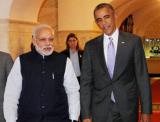Jan 1: The ban on the practice of instant triple talaq, making it a penal offence and the increase in the strength of Supreme Court judges were two of the major achievements of the law ministry in 2019.
In July, Parliament gave its nod to The Muslim Women (Protection of Rights on Marriage) Bill, 2019. The new law makes talaq-e-biddat or any other similar form of talaq having the effect of instantaneous and irrevocable divorce pronounced by a Muslim husband void and illegal.
It makes it illegal to pronounce talaq three times in spoken, written or through SMS or WhatsApp or any other electronic chat in one sitting.
According to the new law, any Muslim who pronounces the illegal form of talaq upon his wife shall be punished with imprisonment for a term which may extend to three years, and shall also be liable to fine.
During the year, four new judges were appointed to the Supreme Court in September, taking its strength to 34, the highest-ever.
However, vacancies in high courts and lower courts are on the rise and convincing state governments and the 25 high courts to come on board to create an all-India judicial service to recruit judges for the subordinate courts tops the agenda of the Law Ministry in 2020.
Besides creating a consensus on setting up the All-India Judicial Services, the ministry will also have to focus on filling up vacancies in the high court. On an average, the vacancies stood at 400 throughout this year.
With more than 5,000 positions of judicial officers in district and subordinate courts lying vacant, the Law Ministry has pitched for setting up all-India judicial services.
The sanctioned strength of the judicial officers in district and subordinate courts was 22,644. The number of judicial officers in position and vacant posts is 17,509 and 5,135, respectively.
The government has proposed that while states and high courts can recruit judicial officers, the Union Public Service Commission (UPSC) can hold pan-India entrance tests.
The ministry has made it clear that such services would not encroach on the powers of the states.
As of now, the selection and appointment of judges in subordinate courts is the responsibility of the high courts and state governments concerned.
The Narendra Modi government has given a fresh push to the long-pending proposal to set up the new service to have a separate cadre for the lower judiciary in the country.
But there is a divergence of opinion among state governments and respective high courts on the constitution of the All India Judicial Service (AIJS).
One of the problems cited is that since several states have used powers under Code of Criminal Procedure (CrPC) and Code of Civil Procedure (CPC) to declare that the local language would be used in lower courts even for writing orders, a person say selected from Tamil Nadu may find it difficult to hold proceedings in states like Uttar Pradesh and Bihar.
The other point of opposition is that an all India service may hamper the career progression of state judicial services officers.
Another key issue the ministry has to handle in 2020 is vacancies in the 25 high courts.
Throughout 2019, on an average, the high courts faced a shortage of 400 judges.
According to Law Ministry data, as on September 1, the high courts had 414 vacant positions as compared to the sanctioned strength of 1,079 judges. The figure was 409 in August and 403 in July, as per the data.
A three-member Supreme Court collegium recommends the names of candidates for appointment as high court judges. In case of appointments to the Supreme Court, the collegium consists of five top judges of the top court.
High court collegiums shortlist candidates for their respective high courts and send the names to the law ministry.
The ministry, along with background check reports by the Intelligence Bureau, forwards it to the Supreme Court collegium for a final call.
The government has maintained that appointment of judges in the high courts is a "continuous collaborative process" between the Executive and the Judiciary, as it requires consultation and approval from various Constitutional authorities.
Vacancies keep arising on account of retirement, resignation or elevation of judges and increase in judges' strength. In June last year, the vacancy position stood at 399, while it was 396 in May.
In April, 399 posts of judges were vacant, while the figure was 394 in March. The vacancy position in February stood at 400 and in January, it was 392, according to the data collated by the Department of Justice.
Over 43 lakh cases are pending in the 25 high courts.
Another priority would be the finalisation of the memorandum of the procedure to guide the appointment and transfer of the Supreme Court and high court judges. The issue had now been pending for over two years now with the SC collegium and the government failing to reach a consensus.
Successive governments have also been working on making India a hub of international arbitration. It has taken several steps to change laws dealing with commercial disputes.
 At the invitation of Prime Minister Modi, the President will travel to India in January 2015 to participate in the Indian Republic Day celebration in New Delhi as the Chief Guest, said the White House in a statement.
At the invitation of Prime Minister Modi, the President will travel to India in January 2015 to participate in the Indian Republic Day celebration in New Delhi as the Chief Guest, said the White House in a statement.




Comments
Wow, wonderful blog structure! How long have you ever been running a blog for?
you make blogging glance easy. The entire glance of your site
is wonderful, let alone the content!
Also visit my web site: helpdesk support: http://aress.support/helpdesk-support.html
Add new comment